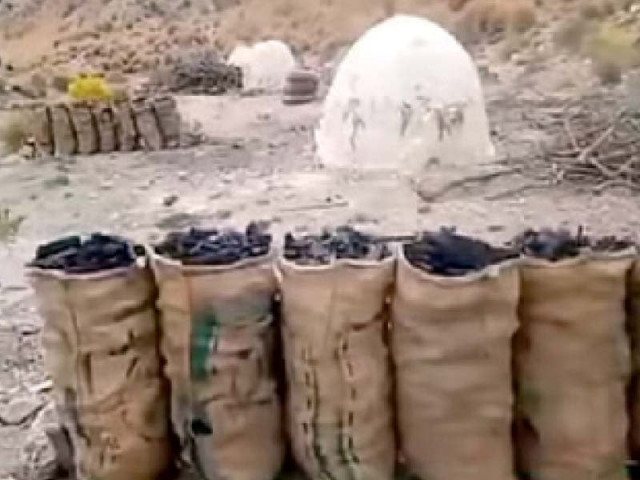Coal, wood prices go up amidst gas shortage
Residents of rural Islamabad resort to expensive alternatives to heat up stoves during colder months

While some in Islamabad have the luxury of switching on a heater, showering with hot water, and eating warm food a significant chunk of the city’s population is deprived of gas.
In particular, residents of the rural settlements in the federal capital have to rely on wood and coal to get by in the winter. For instance, according to a survey of the forestry wing of the Ministry of Climate Change, a total of 30,000 to 50,000 houses burn wood and coal in the densely populated area of the ancient Bari Imam, which is near the Parliament House.
Salman Bukhari, who is a resident of the 400-year old town of Bari Imam, while talking to the Express Tribune lamented that they had been using wood as fuel in their houses for the last 70 years. “The irony is that we are settled behind the Parliament House and are still deprived of gas,” Bukhari remarked.
With gas unavailable, residents are forced to rely on alternative methods of heating for which they have to pay highly inflated prices. Currently, wood is being sold at Rs1,200 to Rs1,400 per kg, coal at Rs150 per kg, kerosene at Rs120 per liter, and a small cylinder of gas costs Rs900 whereas a medium one is sold anywhere from between Rs2,500 to 3,000.
Shujaat Khan, a resident of the Bara Kahu area in Islamabad, complained that the gas shortage was burdening his pocket. “If we use a gas cylinder it costs me about Rs5000 to Rs6000 a month which is highly unaffordable in these trying times,” he said.
The inexpensive solution residents like Bukhari and Khan resort to is cutting wood from nearby forests. “The wood from the forest is free so why not use it?” said Bukhari matter-of-factly.
Read Pakistan, Russia to sign facilitation agreement on gas pipeline
However, their seemingly ingenious solution comes at a cost to the environment as rural areas of Islamabad have polluted air with air quality index readings ranging from 130 to 160 - which is classified as hazardous for health.
Saqib Raja, another resident of Bari Imam, when asked about the negative impact of wood cutting on the air, said, “we will stop cutting down trees if the government provides us with gas. This is our basic right,” an irate Raja said.
Even if residents do not cut wood themselves, its sale due to the gas shortage in winter months skyrockets.
Bahram Khattak, a woodcutter by profession who is based in the capital, while talking to The Express Tribune said, “timber sales increase by 50 to 60% in winter because residents of the twin city burn it to keep warm.”
However, he informed that it was not just the woodcutters who made a decent living in the winter, those selling coal did good for themselves as well. “The demand is so high that coal and wood prices remain jacked up from December to March,” Khattak told The Express Tribune.
Published in The Express Tribune, December 8th, 2021.



















COMMENTS
Comments are moderated and generally will be posted if they are on-topic and not abusive.
For more information, please see our Comments FAQ